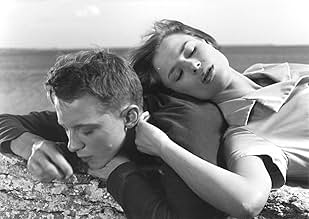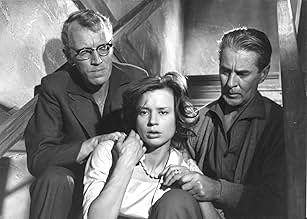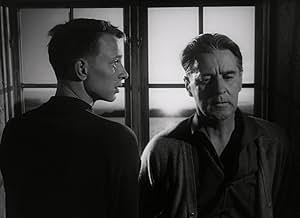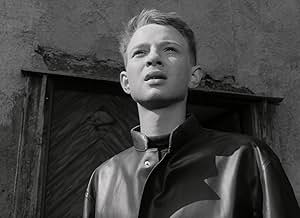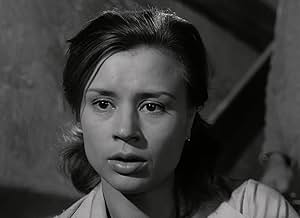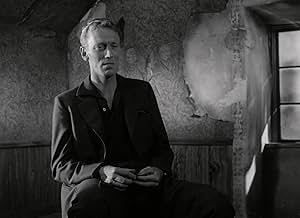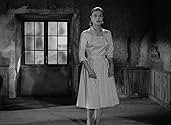CALIFICACIÓN DE IMDb
7.9/10
29 k
TU CALIFICACIÓN
Karin se reúne con su disfuncional familia en la isla que es su hogar tras recibir el alta de una institución psiquiátrica. La realidad se le escapa entre los dedos cuando empieza a creer qu... Leer todoKarin se reúne con su disfuncional familia en la isla que es su hogar tras recibir el alta de una institución psiquiátrica. La realidad se le escapa entre los dedos cuando empieza a creer que Dios la visita.Karin se reúne con su disfuncional familia en la isla que es su hogar tras recibir el alta de una institución psiquiátrica. La realidad se le escapa entre los dedos cuando empieza a creer que Dios la visita.
- Dirección
- Guionista
- Elenco
- Ganó 1 premio Óscar
- 3 premios ganados y 5 nominaciones en total
- Dirección
- Guionista
- Todo el elenco y el equipo
- Producción, taquilla y más en IMDbPro
Opiniones destacadas
this is one of bergman's most serious and devastating, sometimes horribly depressing and (it's only flaw) a little too heavy handed for even the toughest and healthiest viewers. it is fascinating to watch bergman come to terms with the absence of god and man's tragic isolation in an indifferent universe through the art he uses like no one else could or does, the art of film. karin is a mentally disordered young woman, intensely loved by her family and well cared for but nonetheless subject to bouts of extreme madness and delusions of divinity that are so convincing and well performed as to be hard to watch (particularly the scene where she is convinced that a deity disguised as a spider is going to crawl out of a closet). although it ends on a semi hopeful note, the film's atmosphere is largely one of sterility, emotional dryness, impoverishment and despair. karin lives on an isolated island just as we inhabit a vast, incomprehensible universe that is essentially little but a doomed speck of dust in a monstrous cosmos that does not care. i think there can be little debate as to the correct interpretation of this movie, which is the utter void at the center of false human beliefs and illusions of happiness or omnipotence. order is a lie and religious belief is founded on deliberate self deception. a masterpiece of the most passionate artistry and integrity.
Bergman's haunting, somber feature "Through a Glass Darkly" is the kind of distinctive, sometimes uncomfortable, and carefully-crafted movie that can stick in the minds of its viewers long afterwards. Its combination of images, scenery, characters, and themes provides plenty of things to think about, more than could be assimilated in any one viewing. Bergman is one of the very few film-makers who had the knack for making this kind of feature coherent and memorable at the same time.
The story could hardly be more efficient. The very small cast and the tight scenario place a premium on the writing, acting, and photography. The characters have a good balance of similarities and differences that makes for a wide range of possibilities, and the story makes good use of them. The seaside setting is used nicely, with the beautiful scenery and thematic images both complementing the story. The old shipwreck is skillfully worked into a psychologically harrowing sequence.
The setting is combined with the family relationships, biblical allusions, philosophical questions, and much more, to raise a wide range of interesting and thoughtful questions. Although "Through a Glass Darkly" does not feature the extensive use of unusual imagery found in Bergman features like "The Seventh Seal" or "Persona", or the dream sequence from "Wild Strawberries", in its own way it is also effective.
The story could hardly be more efficient. The very small cast and the tight scenario place a premium on the writing, acting, and photography. The characters have a good balance of similarities and differences that makes for a wide range of possibilities, and the story makes good use of them. The seaside setting is used nicely, with the beautiful scenery and thematic images both complementing the story. The old shipwreck is skillfully worked into a psychologically harrowing sequence.
The setting is combined with the family relationships, biblical allusions, philosophical questions, and much more, to raise a wide range of interesting and thoughtful questions. Although "Through a Glass Darkly" does not feature the extensive use of unusual imagery found in Bergman features like "The Seventh Seal" or "Persona", or the dream sequence from "Wild Strawberries", in its own way it is also effective.
This was the first Bergman movie I ever watched. Consequently, it holds sort of a special place in my catalogue of movie memories.
I enjoyed the depiction of the numerous relationships between people or objects which were kept apart by walls or a "dark glass." The artist and the fullness of what he/she is attempting to depict, mankind and God, and more particularly in the film, between Minus and women, Minus and David, etc..
The most gripping, however, were the relationship between David and Karin, and between Karin and "God." I'm not going to get into detail for the sake of those who haven't seen the film. But Bjornstrand's line about the "magic circle" we draw around ourselves instantly vaulted close to the top of my list of movie lines which have impacted me.
Lastly, I appreciated how the von Sydow character, Martin, acted as a representation of what love is not, i.e. his desire to always do the right thing, rather than the honest thing.
I enjoyed the depiction of the numerous relationships between people or objects which were kept apart by walls or a "dark glass." The artist and the fullness of what he/she is attempting to depict, mankind and God, and more particularly in the film, between Minus and women, Minus and David, etc..
The most gripping, however, were the relationship between David and Karin, and between Karin and "God." I'm not going to get into detail for the sake of those who haven't seen the film. But Bjornstrand's line about the "magic circle" we draw around ourselves instantly vaulted close to the top of my list of movie lines which have impacted me.
Lastly, I appreciated how the von Sydow character, Martin, acted as a representation of what love is not, i.e. his desire to always do the right thing, rather than the honest thing.
Her eyes could not deceive what her mind made her believe, though to others she's disturbed and increasingly perturbed, as a cocktail of delusion, creates confusion and illusion, and there's nothing they can do, except observe as she looks through.
There are outstanding performances and there are Harriet Andersson performances and there is a difference between the two, especially under the guidance of this director, as she takes you on the nightmare that Karin lives, the struggles she endures (and of those that surround her), as her world cascades through torment and torture that she can do very little about, and at the time nobody else could be of much help either.
There are outstanding performances and there are Harriet Andersson performances and there is a difference between the two, especially under the guidance of this director, as she takes you on the nightmare that Karin lives, the struggles she endures (and of those that surround her), as her world cascades through torment and torture that she can do very little about, and at the time nobody else could be of much help either.
Through a Glass Darkly marks one of the first collaborations between Bergman and his long time cinematographer Sven Nykvist (who passed away this last September). Nykvist shot films as varied as Lasse Hallestroms 'What's Eating Gilbert Grape' to Woody Allen's 'Crimes and Misdemeanors.' Nykvist's touch is present throughout the film, a style that begins to become a part of Bergman's signature mise-en-scene.
Bergman's screenplay is transitional because of it's scarcity of saturation. Using a cast of only four and only one location, the family's country home on an island off the coast of Sweden. Karin (Harriet Andersson) is slowly going mad, her family (fiancée, father and brother) are trying to understand her and not send her away, trying to let her know that things may be alright as she descends into hysteria, talking to walls, waiting for god to come out of the closet.
The film is quite simply a masterpiece. A portrayal of descent into madness and the effect on others that feels more grounded in reality than even the best of films on madness (see: Shock Corridor Samuel Fuller, One Flew Over the Cuckoo's Nest Milos Foreman, or The Three Burials of Melquiades Estrada Tommy Lee Jones) Nykvist's mostly static camera gives the film a brooding sense of anticipation, lingering motionlessly, allowing the actors to move freely into deep frames, marginalizing themselves as they move about the large empty frame. The camera even goes so far as to linger a little too long at times, waiting long after the actors have exited the frame, making sure that the audience is aware that the hollowness, these spaces they live and think in exist without them, these voids the audience is watching never go away.
These sentiments are echoed by the well penned script. The father's regret over the madness of his deceased wife, the husbands jealousy, his inability to act, the nearly sexual love the brother feels for Karin, his isolation and inability to get over his immaturity. It's a delicately woven, exquisitely beautiful film on the landscapes of the mind and the solitude of life and the search for god. A good introduction to the psychological drama of Bergman for anyone unfamiliar with one cinema's masters.
Bergman's screenplay is transitional because of it's scarcity of saturation. Using a cast of only four and only one location, the family's country home on an island off the coast of Sweden. Karin (Harriet Andersson) is slowly going mad, her family (fiancée, father and brother) are trying to understand her and not send her away, trying to let her know that things may be alright as she descends into hysteria, talking to walls, waiting for god to come out of the closet.
The film is quite simply a masterpiece. A portrayal of descent into madness and the effect on others that feels more grounded in reality than even the best of films on madness (see: Shock Corridor Samuel Fuller, One Flew Over the Cuckoo's Nest Milos Foreman, or The Three Burials of Melquiades Estrada Tommy Lee Jones) Nykvist's mostly static camera gives the film a brooding sense of anticipation, lingering motionlessly, allowing the actors to move freely into deep frames, marginalizing themselves as they move about the large empty frame. The camera even goes so far as to linger a little too long at times, waiting long after the actors have exited the frame, making sure that the audience is aware that the hollowness, these spaces they live and think in exist without them, these voids the audience is watching never go away.
These sentiments are echoed by the well penned script. The father's regret over the madness of his deceased wife, the husbands jealousy, his inability to act, the nearly sexual love the brother feels for Karin, his isolation and inability to get over his immaturity. It's a delicately woven, exquisitely beautiful film on the landscapes of the mind and the solitude of life and the search for god. A good introduction to the psychological drama of Bergman for anyone unfamiliar with one cinema's masters.
¿Sabías que…?
- TriviaThe first Ingmar Bergman film to be made on the island of Fårö. Bergman would later buy a home on the island.
- ErroresAs Minus paints the chair, the amount of paint on the chair changes between shots.
- Créditos curiososThere are no end credits. After Minus (Lars Passgård) says the final line, the film fades to black and ends. The entire cast and crew were credited at the start, and there isn't even a "Fin" or "Ende".
- ConexionesFeatured in Reel Radicals: The Sixties Revolution in Film (2002)
- Bandas sonorasSarabande from Suite No. 2 in D minor for Violoncello
Written by Johann Sebastian Bach
Performed by Blondal Bengston.
Selecciones populares
Inicia sesión para calificar y agrega a la lista de videos para obtener recomendaciones personalizadas
- How long is Through a Glass Darkly?Con tecnología de Alexa
Detalles
Taquilla
- Total a nivel mundial
- USD 8,939
- Tiempo de ejecución1 hora 30 minutos
- Color
- Mezcla de sonido
- Relación de aspecto
- 1.37 : 1
Contribuir a esta página
Sugiere una edición o agrega el contenido que falta

Principales brechas de datos
By what name was A través de un vidrio oscuro (1961) officially released in India in English?
Responda

